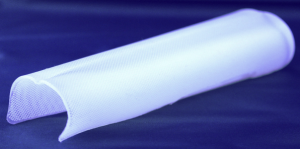The authors of a 2021 paper on a method of male enhancement have been forced to retract the paper after losing a legal battle over the technology.
At the heart (er, groin?) of the matter is a dispute over the ownership of a penile implant. According to court documents, James Elist, a urologist in Beverly Hills, Calif., developed the device, which he commercialized as Penuma for men who want a bit more than nature provided.
Penuma received clearance from the US Food and Drug Administration in 2004, becoming the first such product to reach the market. (As Elist told GQ in 2016, the surgically-implanted devices come only in large sizes because “nobody wants a small.”)
Elist alleges in a lawsuit that in 2018, a urologist in Texas named Robert Cornell contacted him with questions about how to use the Penuma in practice – questions the California physician claims were really efforts at corporate espionage:
In reality, Dr. Cornell’s stated interest in Penuma training was a ruse. Dr. Cornell’s true intention was to gather confidential trade secrets and other information with which he, along with his co-defendants, intended to (and eventually did) launch a competing product. Unware [sic] of Dr. Cornell’s plans, Dr. Elist hosted Dr. Cornell for Penuma training on March 30, 2018. During that all-day training, Dr. Cornell witnessed multiple Penuma procedures, asking Dr. Elist and his associates numerous questions about the development and future of Penuma. Dr. Elist answered those questions. During his visit, Dr. Cornell signed the non-disclosure agreement with IMD (the “Penuma NDA”).
Armed with what he’d learned, Elist’s lawyers say:
Following his Penuma training, Dr. Cornell used the information Dr. Elist and his associates had provided – all subject to the Penuma NDA – to develop a competing implant, now named Augmenta.
In a 2021 paper in Sexual Medicine, Cornell and his colleagues described Augmenta as:
an innovative, technologically advanced subcutaneous elastomer-silicone cosmetic penile implant
But, according to Elist, Cornell’s group were no kind of penile pioneers:
[T]hey did not invent; they stole. Dr. Cornell also included in his patent application Penuma drawings he neither created nor had any right or authorization to use.
Elist asserted two Augmenta patents are
comprised entirely of Plaintiffs’ intellectual property … the product of fraud on the USPTO and unenforceable.
What’s more, Elist has accused Cornell of enlisting the help of another – let’s just call him cinematically named – urologist, Run Wang, who’d served on the advisory board for Penuma and is now a defendant in the suit. Wang, per court documents:
breached the strict confidentiality agreement he entered with IMD by providing substantial assistance and advice to Dr. Cornell and the other co-defendants in exchange for an equity stake in the competing Augmenta implant.
The court agreed with Elist, granting him a preliminary injunction in January 2021 which, among other things, ordered the defendants to stop:
Commercializing, marketing, advertising, promoting, offering for sale, and/or profiting from the Augmenta implant …
It also demanded that they return or destroy surgical instruments and supplies used in the implant procedure and notes Cornell might have taken during the training, and that they stop disclosing trade secrets.
(The court refused to block them from pursuing one of the patents or “preventing Defendants from pursuing any pending Food and Drug Administration 510(k) submission.”)
But in November 2021, Elist and his attorneys became aware of the paper in Sexual Medicine published a month earlier, describing Augmenta as not only unique but commercially available – both of which, they argued, violated the terms of the injunction.
Last month, the court agreed again, issuing an order holding Cornell and his colleagues in civil contempt.
Ryan Baker, one of several attorneys representing Elist in the case, told us the retraction resulted from Cornell and his colleagues violating the terms of the preliminary injunction:
The court found Dr. Cornell and others in contempt of the court’s preliminary injunction order for the publication of the article. The Court then ordered that the article be retracted.
As the notice states:
This article has been removed: please see Elsevier Policy on Article Withdrawal (https://www.elsevier.com/about/our-business/policies/article-withdrawal).
Removed due to legal reasons.
Also withdrawn was an erratum to the paper, dated Feb. 1, 2022, which declared:
In the article entitled “The Augmenta Implant: A Cadaver Model of a Novel Anatomic Subdermal Implant for Cosmetic Penile Enhancement” by Clavell-Hernández J et al (Sex Med 2021;9:100447); after publication, the authors asked to clarify the following: the Augmenta is not currently commercially available.
Cornell has not responded to a request for comment.
Like Retraction Watch? You can make a tax-deductible contribution to support our work, follow us on Twitter, like us on Facebook, add us to your RSS reader, or subscribe to our daily digest. If you find a retraction that’s not in our database, you can let us know here. For comments or feedback, email us at [email protected].

Why the inuendo jokes at the begining of the article. Are we losing objectivity? No wonder this page is losing readers.
You’re probably new here. Mild jokes are a thing on this blog since I read it. Maybe you should look for other blogs that diligently report on retractions in a more “objective” way (hint: you won’t find many).
About losing readers, you wouldn’t have some shadow of evidence supporting your rant, would you?
“Phrasing. Are we still doing phrasing?”
I disagree. I think using innuendo, word play and other editorial phrasing makes the article better. This makes reading the article easier and more enjoyable.
Agree especially that the matter at hand (….) is quite , let’s say, laughable !!!
It’s a hard act to follow.
Interesting article published in Propublica/New Yorker today
https://www.propublica.org/article/penis-enlargement-enhancement-procedures-implants about Dr Elist and Penuma